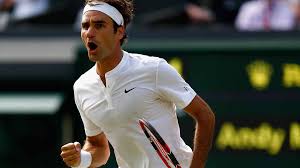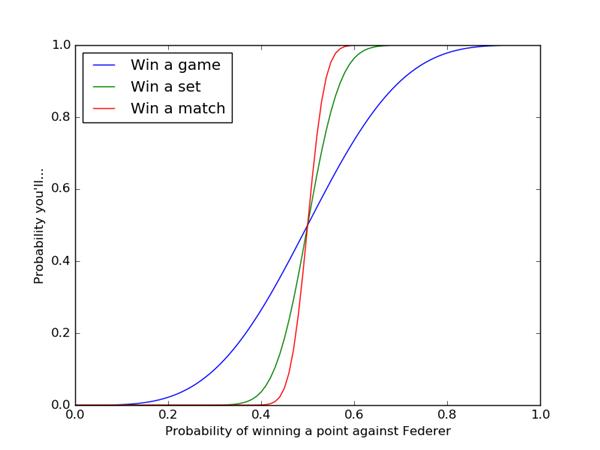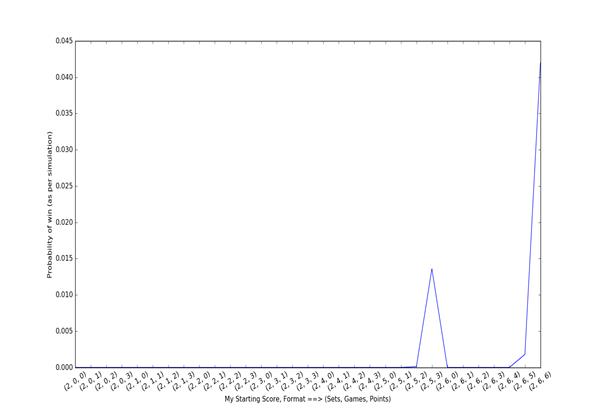Can you beat Federer?!
05 Jul 2016
. category:
Math
.
Comments
#fivethirtyeight
#puzzle
#tennis
This weekend, I came across a puzzle on FiveThirtyEight - Can you figure out How to Beat Roger Federer at Wimbledon?! I just had to dive in! Now this challenge had Monday morning as a deadline, so I decided to pull an all-nighter(gave up by 5 in the morning -_-)! Little did I know, it took me 2 more days to completely understand the problem.

So, the problem states that I’m playing Federer, in his prime in the Wimbledon Championship Finals, and I have the liberty to start the match at any score of my choice. I have a 1% chance of winning a point against Federer. I have to decide which point should I start the match and what would be the probability of me winning the match.
Now, at first glance, the answer is Match Point, two sets to love… but I have to prove it mathematically/computationally.
My initial approach was to code the tennis match and then iterate over the possible scores to evaluate the best score and probability. I decided to use Wimbledon 2008 Finals statistics to get the serve points and receiving points statistics, thanks to Tennis Abstract. When I was through with coding a tennis match simulation of sorts, I hit a dead end. And then hit the realization that I should have done a little research on this.
I came across an excellent research paper, Forecasting the winner of a tennis match, which highlighted the key areas I needed to concentrate on. Ideally, this is not a simulation problem, rather one from Combinatrics. To win a game, I need to win 4 points – so the probability can be easily calculated.
 Here p is the probability of me winning a point against Federer, assumed to be 0.01.
Here p is the probability of me winning a point against Federer, assumed to be 0.01.
Thus, the probability to win a set and therefore, a match can similarly be calculated. However, as described in the question, we need to decide the starting score, thus the scores need to be iterated over.
Post calculation, I could easily see that starting from 2 sets to love, 5-0, 40-0 will give me the highest probability to win the match. The calculation can be verified in this script. The exact value of me winning the third set (from 2-0, 5-0, 40-0) is 0.0297020058671. Considering that I lose that set, there is absolutely no question of coming back – chances of me winning a new set from Federer are 2.35304918031e-39. Awesome!
I wrote a small script to analyze how the probability of winning a point affects the probability of winning a game, set or match.

How the chances of a player winning changes with the chances of his winning a point
Having started work on simulating the match, I decided to verify my results with a measured simulation. So, I’m keeping Federer at - Zero Sets, Zero Games, Zero Points, while I vary my score over the first three sets. For each score, I’m testing over Ten Thousand iterations to have a big enough sample. In the simulation, I’ve calculated different probabilities for my service and return games - based on Federer’s statistics from the ‘08 final. For each iteration, I pick a random number and if it’s greater than 0.99(plus minus the service/return factor), I win a point, and thus the match progresses.

How I'm winning over different starting scores
Clearly the graph shoots up at Match Point, two sets up – indicating that I’ll win the match 140 times out of the 10K trials. The interesting thing to see is that it peaks again in the tie-break when I’m 6-0 up. This is because in the tie-break, I would have six match points to play with, while at 5-0,40-0 I’d have only 3 match points. The script for the simulation can be found here.
Yeah, so that’s pretty much it! Waiting for the results to be announced by FiveThirtyEight!
Edit : So, apparently I didn’t think through the problem carefully – the correct answer is 2 sets up, 6-0 up in third set’s tie-breaker. The probability would be around 5.85% while I’d calculated 2.97%. Here, have a look at the official solution.
Find the Github repository here.
Sources
